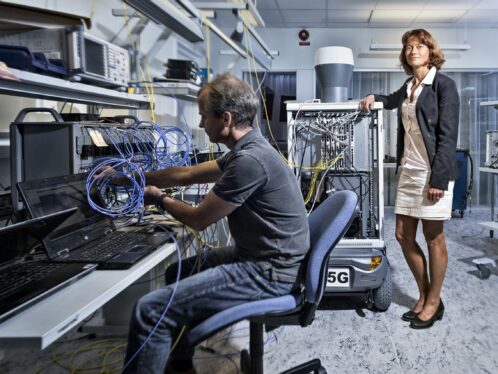
Slick research
At Imperial College London, Professor Hugh Spikes studies the effects of friction.
Professor Hugh Spikes, who holds the personal chair of Professor of Lubrication at Imperial College London, is no ivory-tower scientist, and he welcomes relationships between research and industry. “There’s always been a slight element of snobbery in the pure sciences about industrial funding,” he says, “but research in engineering, by definition, always has practical applications.” Spikes says this pragmatism is nothing new and cites Guillaume Amontons’ classic paper on friction in 1699 and Osborne Reynolds’ on lubrication in 1886. Accordingly, Spikes is proud of his own involvement with industrial companies. “My interests have always been in the combination of fundamental science with practical applications,” he says. “I like the more casual ambience, and I also enjoy the industrial contacts; they are highly stimulating, and the more enlightened industries have a refreshingly long-term outlook. I’m fortunate enough to be in a very trusted position with several major companies, such as British Petroleum, Nippon Oil, Shell, and SKF.” The significance of Spikes’ contribution to the field of tribology is beyond doubt. In 2004, Spikes was awarded the Tribology Trust Gold Medal, the International Award of the Society of Tribologists and Lubrication Engineers and the Mayo D. Hersey Award of the American Society of Mechanical Engineers. Together with his research students, he has received 10 “best paper” awards from the Institution of Mechanical Engineers, the Society of Tribologists and Lubrication Engineers and the American Society of Mechanical Engineers. The multidisciplinary nature of tribology is reflected by Spikes’ research group at Imperial College, which consists of mechanical and chemical engineers, physicists, chemists and material scientists whose research areas include hydrodynamic and elasto-hydrodynamic lubrication, lubricant chemistry, surface coating technology, contact mechanics and wear and surface fatigue. The list of applications is almost endless, ranging from micro-machines, scientific instruments and personal-care products to marine propulsion, motor vehicles, helicopters and industrial machinery. When the introduction of low-sulphur diesel fuels in 1991 led to widespread failure of diesel fuel pumps, Spikes’ research into the lubrication properties of diesel fuels resulted in the development of techniques to test their friction and lubricating performance. The testing equipment developed as a result of this research is now produced by the spinoff company PCS Instruments, and it has become the industry standard for measuring diesel lubricity. New areas of research for the Imperial College group include MEMS (micro-electro-mechanical systems), examples of which include silicon chips, air bags and inkjet printers. Engineered tribology in the wind energy sector is one focus area. While the industry currently focuses on durability, Spikes believes efficiency will be increasingly important in the future. “These areas encompass a vast range of applications,” he says. “The most obvious, perhaps, are those that relate to motor lubricants and additives, which is a research-focused area. Engine oil specifications change every four or five years. Basic car engine oil now has between 10 and 15 added chemicals: antioxidants, friction modifiers, anti-wear additives, foam inhibitors, dispersants, detergents and corrosion inhibitors. It’s a very high-tech job to get them all to work together. And the emphasis has changed, too, as durability is not enough anymore. Increased efficiency has become critical, as has the need for making lubricants suitable for after-treatment systems such as catalytic converters. Currently one of our main research priorities in the area of engine oils and additives is reducing engine emissions. Road traffic pollution and related respiratory diseases are of major concern in today’s urban environments.” Spikes’ group also works extensively with less-obvious applications. “Friction is present during any physical interaction between two surfaces, and this has led to some unusual areas of investigation and development,” he says. “One example is the performance of replacement hip joints; food technology is another area. We have recently worked on a project with Unilever to enhance the taste of low-fat foods. Taste is related to friction within the mouth, and we explored how to design low-fat food products that have friction characteristics that mimic those of high-fat ones.” And as to the future of tribology, Spikes speculates that micro machines will garner intense interest. “They are widely present in everyday technology, and although the science of nanomachines is in its infancy, the challenge of machines constructed from individual atoms, designed to manipulate matter, raises exactly the same issues that tribology deals with now – friction, wear and lubrication – but on an almost unimaginably small scale.”




